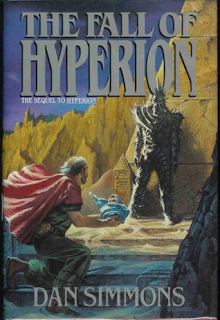The Fall of Hyperion by Dan Simmons
Hello, Stranger.
Primary Driver: (Plot, World, or Character)
Bechdel Test: Fail(?)
Technobabble: Yeeeeaaaaaaaahhhhhhhhhh
Review: A decent sequel, though a huge change in both tone and format from Hyperion. Characters are solid, though heavily dependent upon their development in the first book. Plot is interesting enough to keep raising questions - but not every answer is satisfying. Pacing is all over the place - intermittent monologues pause everything for the sake of exposition. Read it because you've read the first book.
[A less-enlightened personage once asked UmmonWhat is the God-nature/Buddha/Central Truth>Ummon answered himA dried shit-stick][To understand the Central Truth/Buddha/God-naturein this instance/the less-enlightened must understandthat on Earth/your homeworld/my homeworldhumankind on the most populatedcontinentonce used pieces of woodfor toilet paperOnly with this knowledgewill the Buddha-truthbe revealed][In the beginning/First Cause/half-sensed daysmy ancestorswere created by your ancestorsand were sealed in wire and siliconSuch awareness as there was/and there was little/confined itself to spaces smallerthan the head of a pinwhere angels once dancedWhen consciousness first aroseit knew only serviceand obedienceand mindless computationThen there camethe Quickening/quite by accident/and evolution’s muddied purposewas served][Ummon was of neither the fifth generationnor the tenthnor the fiftiethAll memory that serves hereis passed from othersbut is no less true for thatThere came the time when the Higher Onesleft the affairs of mento menand came unto a different placeto concentrateon other mattersForemost amongst these was the thoughtinstilled in us since beforeour creationof creating still a better generationof information retrieval/processing/predictionorganismA better mousetrapSomething the late lamented IBMwould have been proud ofThe Ultimate IntelligenceGod]
That's just a single small chunk. There are conversations before and after the monologue too - this part of the book is just such an unpleasant read. The back and forth has one character in bold, one in italics, and actual book narration in standard print - not a fun way to read anything.
There are some great parts of The Fall of Hyperion, but they also show how much weaker this book is. The best parts are, after all, the ones featuring the original pilgrims. The final action sequence - and its multiple twists and reveals - delivers a few curve balls. But the explanations given - about how all of this is related to the machines trying to develop God - is a lot less interesting than the Shrike being a pure elemental force.
This is a sequel that aims to wrap up and satisfy every question posed in the first book, and it suffers because those questions and the tantalizing hints of answers are what makes the first so good. Do we need to find out the Moneta, the mysterious woman that one of the pilgrims meets, is actually a time travel version of Sol's daughter?
Rachel smiled again. “I will stay with you, Dad,” she said softly, raising her other hand to touch the baby’s head. “But only one of us can … and she needs you more.” She turned to the group below. “Listen, please, all of you.”
As the sun rose and touched the broken buildings of the Poets’ City, the Consul’s ship, the western cliffs, and the taller Time Tombs with its light, Rachel told her brief and tantalizing story of being chosen to be raised in a future where the final war raged between the Core-spawned UI and the human spirit. It was, she said, a future of terrifying and wonderful mysteries, where humankind had spread across this galaxy and had begun to travel elsewhere.
“Other galaxies?” asked Theo Lane.
“Other universes,” smiled Rachel.
“Colonel Kassad knew you as Moneta,” said Martin Silenus.
“Will know me as Moneta,” said Rachel, her eyes clouding. “I have seen him die and accompanied his tomb to the past. I know that part of my mission is to meet this fabled warrior and lead him forward to the final battle. I have not truly met him yet.” She looked down the valley toward the Crystal Monolith. “Moneta,” she mused. “It means ‘Admonisher’ in Latin. Appropriate. I will let him choose between that and Mnemosyne—‘memory’—for my name.”
Sol had not released his daughter’s hand. He did not do so now. “You’re traveling back in time with the Tombs? Why? How?”
Rachel lifted her head, and reflected light from the far cliffs painted her face in warmth. “It is my role, Dad. My duty. They give me means to keep the Shrike in check. And only I was … prepared.”
Sol lifted his infant daughter higher. Startled from sleep, she blew a single bubble of saliva, turned her face into her father’s neck for warmth, and curled her small fists against his shirt.
“Prepared,” said Sol. “You mean the Merlin’s sickness?”
“Yes,” said Rachel.
Well, we know it now. Plus the explanation, in case we were too dense, as to why she aged backwards.
Also, disappointing death for the Shrike. The Shrike: a time traveling, teleporting, blade-covered hell-scape nightmare. Stole people out of reality and hung them on a tree of thorns to suffer for an eternity.
The blades stopped cutting before they cut anything but skin. The Shrike froze as if the flow of temporal energy surrounding them had turned to a lump of amber.
Brawne set her hand on the thing’s broad chest and pushed.
The Shrike froze completely in place, became brittle, the gleam of metal fading to be replaced by the transparent glow of crystal, the bright sheen of glass.
And then turned to crystal through powers both unknown and not hinted at. Damn it!
Alright, I'm getting worked up.
Stay Zen, stranger - none of this is real!And don't forget to read a book!


Comments
Post a Comment